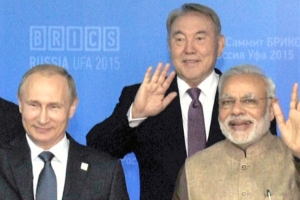The Pap-Angren Railway and Its Geoeconomic Implications for Central Asia
By Mirzohid Rahimov
April 19th, 2016, The CACI Analyst
Central Asian nations consider the development of alternative regional transport communications important aspects of their national economic and political strategy, and the republics have become active participants in various international projects to promote economic cooperation with different countries and regions of the world. The development of internal Central Asian communication networks in general, and Uzbekistan in particular, gives the possibility of extending not only national communications, but also broaden networks in Central Asia. The Angren-Pap rail project is very important for national connectivity and for increased international communication. Different international experiences in economic transformation are relevant for Central Asia’s regional connectivity.
Central Asia, the AIIB and the advent of 5G communication
By Kairat Bekov and Gregory Gleason
April 1st, 2016, The CACI Analyst
Competition over technological advantage has replaced rivalry over territorial advantage in the great games of contemporary Central Asia. One of the main thoroughfares of the modern “Silk Road” is the telecommunications highway. The impending advent of fifth generation telephone technology is opening yet a new sphere of interaction among the countries of Central Asia offering as many opportunities for regional cooperation as it creates for competition.
Russia-Uzbekistan migration agreement unlikely to change conditions for migrants
By Umida Hashimova
February 10th, the CACI Analyst
Uzbekistan and Russia are working to develop a governmental agreement on organized job placements for potential labor migrants from Uzbekistan to Russia. Such agreements usually mean that future employees will have an agreed job, salary, place to live, insurance, and all permission papers for employment before they leave their home country. Some have interpreted this as a sign of warming relations between the two countries by which Russia is easing the conditions for about two million migrants from Uzbekistan in exchange for some sort of concessions by Uzbekistan’s government.
Russia's Syria initiative and the exaggerated ISIS threat to Central Asia
By Emil Aslan Souleimanov
September 25th, 2015, The CACI Analyst
Russia’s recent military engagement in Syria and calls for the establishment of an international coalition against the terrorist group calling itself the Islamic State (ISIS) has produced renewed interest in Moscow’s policies toward the jihadist quasi-state. Against this background, while many have speculated about Moscow’s true intentions in the Middle East, relatively little attention has been paid to Moscow’s interests in Central Asia and the Caucasus in the context of its increasingly vocal rhetoric of fighting ISIS. Moscow is actively utilizing the risks and threats stemming from the ISIS to boost its clout in the near and far abroad.
Was the SCO summit in Ufa a breakthrough?
By Stephen Blank (19/08/2015 issue of the CACI Analyst)
The annual summit of the Shanghai Cooperation Organization took place on July 9-10 in Ufa, and ratified the expansion of membership to include India and Pakistan, and Iran may join in the future. Thus the SCO is well on the way to becoming a venue for the most powerful Inner Asian states to work together and discuss policy issues affecting Central Asia and beyond. But new membership is not likely to make this organization any more effective as a regional security provider. In fact, all the disputes among the major members, including India and Pakistan, might be imported into the SCO’s structure and serve as a brake on the expansion of its capabilities.








